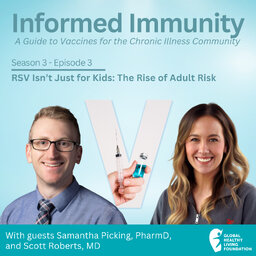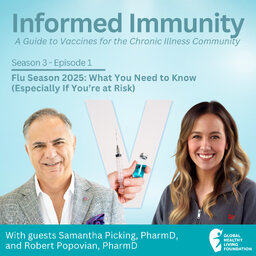S2, Ep 11- It's Okay to Not Be Okay: A Journey to Mental Illness Advocacy
Wellness Evolution
A podcast bringing you diverse conversations about the mind, body, and wellness journey. The podcast is part of the Global Healthy Living Foundation P…In this conversation, Pamela Price talks about her experience as a Black health care professional who deals with personal mental illness. She shares how her journey led her to work with national and government agencies, where she plays a role in developing and implementing programs to cater to the needs of women and underserved communities. Pamela a sheds light on the challenges faced by health care professionals from marginalized communities and the impact of their work in creating a more equitable health care system.
Among the highlights in this episode:
2:24: Pamela Price shares her personal health journey, discussing her struggles with mental health and how it led her to become an advocate
4:40: Angel Tapia, Senior Manager of Hispanic Outreach, and Pamela discuss the importance of giving yourself permission to seek help and support for mental health concerns. They also address the impact of mental health stigma within the BIPOC (Black, Indigenous, and People of Color) community
5:19: Pamela elaborates on how stigmas hinders the BIPOC community and how it can create false narratives about mental health, contributing to increased suicide rates among Black youth
8:42: Pamela talks about the power of sharing her story on social media, how it can create a safe space for others to open up about their mental health, and how it can lead to more open conversations within families
11:46: Pamela highlights some policies in the school system that may hinder mental health support for children and emphasizes the need for more minority mental health professionals and culturally tailored interventions
13:38: Pamela mentions the positive shift in legislation towards increased funding for mental health support and the importance of normalizing mental health conversations in various sectors of society
16:00: Pamela emphasizes the importance of focusing on personal wellness in order to be an effective advocate and support for others
19:25: Angel and Pamela discuss the need for individuals to regularly check in with themselves, regardless of whether they have a diagnosed mental health condition, in order to maintain their overall mental health
21:01: Pamela emphasizes the role of generational trauma and genetic links in mental health, particularly within Black and Brown communities
23:30: Pamela shares the importance of educating oneself and others about mental health signs, symptoms, and resources
25:10: The need for the current generation to adapt and provide support to younger generations in a rapidly changing society
26:30: Pamela suggests seeking out resources and support groups in order to better understand and manage mental health
Contact Our Hosts
Angel Tapia, Senior Manager of Hispanic Outreach: atapia@ghlf.org
Danielle Ali, Senior Systems Analyst: dali@ghlf.org
Amy Finkelstein, Operations Administrator: afinkelstein@ghlf.org
We want to hear from you. Send your feedback and comments via email, video, or audio clips to wellnessevolution@ghlf.org.
In 1 playlist(s)
Wellness Evolution
A podcast bringing you diverse conversations about the mind, body, and wellness journey. The podcast…Social links
Follow podcast
Recent clips

RSV Isn’t Just for Kids: The Rise of Adult Risk
19:45

Why Staying Up to Date on COVID Vaccines Matters If You Live With a Chronic Condition
38:49

Flu Season 2025: What You Need to Know (Especially If You’re at Risk)
19:10
 Wellness Evolution
Wellness Evolution